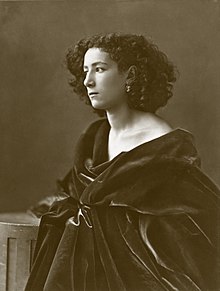
Back سارة (اسم) Arabic Sara (Name) German Sarah NB Sarah (given name) SIMPLE Sarah SL שרה (נאָמען) YI
 Actress Sarah Bernhardt (1844-1923) was one well-known bearer of the name. | |
| Pronunciation | |
|---|---|
| Gender | Female |
| Name day | June 26 |
| Origin | |
| Language(s) | Hebrew |
| Meaning | "noblewoman", "princess",[1] |
| Region of origin | Hebrew |
| Other names | |
| Alternative spelling | Sara |
| Nickname(s) |
|
| Related names | |
| Popularity | see popular names |
| [2] | |
Sarah is a common feminine given name of Hebrew origin.[3][4][5] It derives its popularity from the biblical matriarch Sarah, the wife of Abraham and a major figure in the Abrahamic religions. It is a consistently popular given name across Europe, North America,[1] and the Middle East — being commonly used as a female first name by Jews, Muslims, and Christians alike, and remaining popular also among non-religious members of cultures influenced by these religions.
In Hebrew, Sarah (שָׂרָה) is the feminine form of the noun Sar (שַׂר), which commonly translates to "chief", "ruler" or "prince". It is also related to the verb שָׂרָה, which is also the basis of the name Israel.[6] In Modern Hebrew, Sarah (שָׂרָה) is the feminine form of the word for "minister". In Italy, Sara is a common nickname for the name Serafina/Seraphina, which is in turn derived from the word seraph, a high-ranking angel in the hierarchy of angels.
In the United States, Sarah has been counted among the top 150 given names since 1880, when name popularity statistics were first recorded in the United States. Sarah was ranked among the top 10 names from 1978 to 2002, reaching a plateau of popularity from the early 1980s to 1988. Every year since and including 1989, it has fallen in popularity, but it remained the 30th most–popular name for newborn girls in 2010. Its most common variant spelling, Sara, was number 121.[7]
The name has been similarly popular in Ireland and the United Kingdom. In England, it gained popularity after the Protestant Reformation.[1] In 2014, Sarah ranked as the tenth most popular female baby name in Ireland.[8]
In Nazi Germany, female Jews who did not have "typically Jewish" given names were forced to add "Sara" as of January 1939, whereas males were forced to add "Israel".[9][10]
- ^ a b c "Behind the Name: Sarah". Retrieved 28 August 2018.
- ^ Sarah – Meaning and origin of the name Sarah
- ^ "The amazing name Sarah: Meaning and etymology".
- ^ "Sarah Name Meaning (Origin, Popularity & Nicknames)". 30 September 2022.
- ^ "Sarah | Etymology of the name sarah by etymonline".
- ^ "The amazing name Sarah: Meaning and etymology".
- ^ Popular Baby Names Archived 2018-02-02 at the Wayback Machine, Social Security Administration, United States. Retrieved January 9, 2012.
- ^ "PASSPORTS ISSUED 2014 - 3 Years of Age or Under" (PDF). Retrieved 6 March 2015.
- ^ "Law on Alteration of Family and Personal Names — United States Holocaust Memorial Museum".
- ^ Schreiber, Mordecai; Schiff, Alvin I.; Klenicki, Leon (2003), The Shengold Jewish Encyclopedia, Schreiber, ISBN 9781887563772